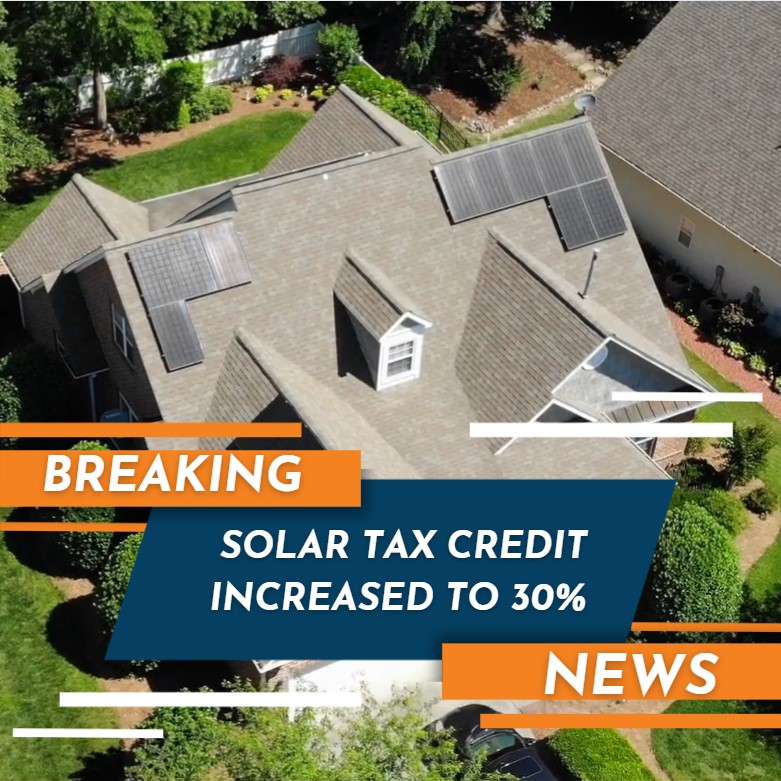Solar Tax Credit Raised To 30%
Inflation Reduction Act of 2022
As solar loans and costs for system components are expected to increase, The Inflation Reduction Act of 2022 states that the tax credit for solar systems will begin at 30% until 2033. This act was a result of Senator Joe Manchin & Democrats deciding a reconciliation bill for renewable energy and climate measures, where $370 billion will be allocated for these efforts. Once 2033 arrives, the tax credit will return to 26% and then reduce again to 24% in 2034.
What This Means For Solar Energy
In regards to the solar industry, the federal tax credit for customers installing a PV solar system to their home or business will now be 30% as opposed to the previous percentage being 26%. This 4% increase will allow for customers to receive more money back when they purchase a solar system using cash or a solar loan. The 30% tax credit will be applied to installs on both homes and businesses. Customers who installed a solar system from the beginning of 2022 will also receive a 30% tax credit on their installation. Energy storage units that were installed from the beginning of 2022 will be eligible for the 30% tax credit, even if those energy storage units aren’t paired with a PV solar system.

According to The Biden Administration, this credit will allow for 7.5 million more solar installations for families since families are able to save more on energy than ever before. In fact, families who install PV solar systems on their home can expect to save $9,000 during the lifespan of their system, which equates to $300 a year. Besides only using solar systems, The Biden Administration states families who utilize clean energy, practice energy efficiency, and use electric vehicles can expect yearly savings of over $1000.
Additional Incentives
Depending on the project, additional “adders” may be added to the tax credit to potentially increase the credit to up to 50%. Some of these adders include factors such as domestic product use, type of organization, and project location.
Certain developers may be entitled to a “direct pay” provision. To qualify, a developer needs to have little to no tax liability. Developers may then be able to treat the credit as an overpayment of tax. In result, developers can receive a cash refund based on the overpayment. (Probably for commercial purposes)
Frequently Asked Questions About Solar for Your Home:
How exactly does going solar and a solar system itself work?
How many solar panels do I need for my home?
Roof-size/available space: When we look at the size of your roof and the space available, we gather data that tell us the maximum number of solar panels your home or site can hold and we even consider shading. We use a software “Suneye” which takes a 360 picture of your roof and we use this photo to determine if your home is a good candidate for solar.
Energy Usage: When we determine energy usage we look at your past electrical bills from over the course of a year to make sure your system isn’t too big or too small.
Your Budget: We take your budget seriously and most importantly, we want you to be satisfied with our services. We take your feedback on how much you want to spend so that we can size your system appropriately.
What is solar net-metering?
Does Duke Energy offer net-metering?
Curious about the cost of a home solar system?
When our clients ask this question, we immediately tell them about the federal tax credit that comes with going solar: it allows you to increase your tax refund, or decrease the amount of taxes you owe on your system.
The federal tax credit is currently at 26% and will remain at that number through the end of 2022, giving you plenty of time to take advantage of the savings! For example, if the total cost of you system was $22,000, when you subtract 26% you are then left with a $16,280 solar system. There is not set price for a home going solar as there are many factors that contribute to the total cost. The price of a solar home can range from $10k to $100k based on the size of your roof, energy usage, aesthetic preferences, and of course, budget.
Get Started on Your Solar Journey Today!
Speak to Us Today!
